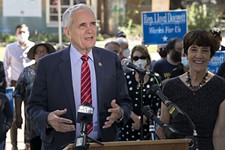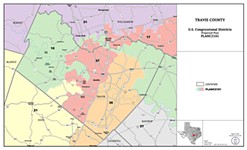Welcome to the Circus!
The redistricting fight and the grassroots politics of chaos
By Richard Whittaker, Fri., March 9, 2012
After more than six months of trials, delays, allegations, and political infighting, the 2012 Texas redistricting process seems to have reached a resolution – at least for the moment. Yet when the San Antonio federal court finally released its interim House, Senate, and Congressional maps on Feb. 28, anyone who thought it would then be primary business as usual was delusional. The extended process has sparked an explosion of unintended consequences: Election officials are struggling to redraw precincts and find the staff to run them; the parties are panicking about organizing conventions; and candidates are wondering how they'll squeeze a year's worth of primary and general election campaigning into less than eight months. And should a D.C. federal court charged with reviewing the maps for compliance with the Voting Rights Act reject them, all those election plans could go right back to the drawing board. For the folks on the political ground, anger and stress have collapsed into weary, punch-drunk acceptance that Texas elections are still in uncharted and treacherous waters.
A year ago, Travis County Clerk Dana DeBeauvoir expected a standard March 6 Super Tuesday primary. Now she has district maps and a May 29 primary date – and her work has just begun. She explained, "The two most important things to conduct an election are election workers and polling places." She could neither hire staff nor lease polling places until the court ruling, "so we can do nothing about the two most important things." However, that only begins the process. The county still has to draw new precincts – no small task. "In Travis County, we have a [Geographic Information System] that allows our voter registrar to do that efficiently," she said. "In a lot of counties in the state, that process is done manually."
While she is glad to have a primary date, May 29 is actually a real headache, DeBeauvoir explained: "It is convenient for the parties, and it is sooner rather than later, but it is not ideal for voters." Sandwiched between the long Memorial Day weekend and the final day of classes in Austin public schools, it is also during the brief gap between the end of regular classes at UT and the start of the summer session, meaning thousands of students registered to vote in Austin will be out of town. And they're not the only absentee voters on the county's mind; the 2010 Military and Overseas Voter Empowerment Act requires counties to ship ballots to personnel serving overseas 45 days before the election. Said DeBeauvoir, "That means you have to have already proofed your ballot, tested your ballot, locked it down, and mailed it out, and all of that happens way in advance of election day."
But the biggest timing problem for DeBeauvoir's office is that the state primaries will now run right up against the municipal election. It's a horrific timeline: Austin voters will elect a mayor and council members on May 12, then start early voting for the state election on May 14 – allowing only a 39-hour gap between elections. "That's how tight this calendar is," she said. Moreover, increasing the pressure, the county must have the new precinct lines drawn for May 12 – not May 29. (Plus there could be run-offs in both sets of elections as well: June 23 for the city, July 31 for the primaries.) The pressure is undoubtedly on – the only silver lining is that, knowing that the two elections might be so close, the city has already procured its own voting machines. "Now they're looking pretty smart," DeBeauvoir said.
Overshadowing all this practical complexity is the simple fact that everyone – from directly involved public officials to voters – is baffled by the situation, which could get worse. Even now, that May 29 date is not set in stone as the primaries could be pushed back into June. The Texas Legislative Black Caucus, Travis County, and other parties have submitted an advisory to the D.C. federal court requesting that the court deny VRA preclearance to the interim map, and the new district maps could still be challenged before the U.S. Supreme Court. Among the delays, the ambiguities, and the back-to-back elections, DeBeauvoir said, "Voters will be confused."
Tock-Tick, Tock-Tick
The clock is running backward.
In a normal election year, the timetable is very clear – but not in 2012. When it comes to the legal wrangling, Republicans and Democrats are on opposing sides, but they have exactly the same administrative fears. Travis County Republican Party communications director Andy Hogue said: "We have an army of hundreds of election judges, alternate judges, and precinct chairs. Those people have vacation plans; they have Memorial Day plans; and those are pretty much shot by the May 29 date." This is where realism hits political activism; the parties had to hope their loyalists will still be available once the calendar was set. Hogue said, "They say, 'I can't just hang in there forever; I've got a life to live, and this is only going to pay me for 12 hours. I can't just put my life on hold for 120 bucks.'"
The delay also throws the county conventions into disarray. At this time in 2010, Travis County Democrats were already printing delegate badges. This year, party chair Andy Brown said, "it will all be booked at the last minute," including the venue. "A year ago, we reserved the Palmer Events Center for March 24," Brown explained. "Plenty of space, right in the middle of Downtown; the price was good." Then the primaries got moved, and the party was left flailing to find a new venue. Palmer and the Travis County Expo Center were both booked out for months, Brown said, "So now we are booked tentatively on April 21 in the Austin Convention Center." If the courts stick with that date, then the party will not be able to verify that potential delegates actually took part in the primary – because the primary will not have happened yet.
Brown said he his staff met in late February to talk through their options and came to few solid conclusions: "In that meeting, we didn't know if the delegates from the precincts will have been selected or not, or somehow we'll have to do that at the county convention, or if the court is going to order something altogether that we don't understand yet." Local Republicans tell a similar story. With their county and state conventions both booked for June, Hogue is worried that his party will have to find shortcuts to make the process work.
Both parties are coming up with extraordinary fixes to make the county conventions work, like asking delegates to pledge that they really will vote in the primary. Regular precinct conventions, normally scheduled for the evening of primary day, may be replaced by less formal conclaves at the county level. Matt Glazer, executive director of statewide think tank Progress Texas, foresees chaos on the convention floor for both parties: "You're going to have a lot less people turn up at the state conventions, you're going to have a lot of people confused about how to become a national delegate, and you're going to have a lot of people who've been through this process a lot of times – and they've never seen anything like it."
Got something to say on the subject? Send a letter to the editor.












